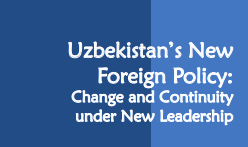The Long Game on the Silk Road: US and EU Strategy for Central Asia and the Caucasus

Uzbekistan's New Foreign Policy: Change and Continuity under New Leadership

Secular Governance in Central Asia: the Case of Kazakhstan Roundtable Event Summary Online
Secular Governance in Central Asia: the Case of Kazakhstan
Event Summary by Sarah Martin
On Tuesday, December 12, the Central Asia-Caucasus Institute (CACI) hosted an off-the-record roundtable discussion at the American Foreign Policy Institute on Kazakhstan’s unique form of secular governance among its Central Asian and compared to its Western counterparts. The event was a continuation of CACI’s research on the models of secularism in Central Asia and the Caucasus. The previous discussion unpacked practices of secularism as found in Azerbaijan. This event also follows the release of a Silk Road Paper on Kazakhstan’s relationship with Europe.
As CACI tracks and evaluates the government models in Kazakhstan and Azerbaijan, the intent is to build a larger, more comprehensive image of secularism as experienced and practiced in the entire Central Asian region. Central Asia in general and Kazakhstan in particular have the potential to be an important partner to the United States and Europe in their fight against radical Salafi-jihadism and their defense against Russian aggression. However, Dr. Cornell noted that an understanding between the US and Central Asian states is critical. As of yet, there is a jarring disconnect between Washington and Astana, and that disconnect lies on either country’s understanding of the relationship between politics, religion and their society’s tolerance for extremism.
The mixing of religion and politics in the Islamic world has led to unpleasant and costly experiences, Dr. Cornell said, though it is not for lack of trying. Turkey is one such example. The West once heralded Turkey’s secular model as a prime example of modernization done correctly in the Middle East. Later, this approach changed to a sense that secularism was unnatural and counter-democratic; instead, “moderate Islam” enjoyed American and European support. However, Turkey’s recent rejection of democracy, its embracing of authoritarianism charged with a resurgence of conservative Islamic rhetoric, has left much room for skepticism regarding the relationship between religion and politics. Some even suggest that a moderate model of religious-leaning forms of government in the Middle East is unfeasible, considering that within Muslim-majority states, sharia law is widely supported, according to a Pew study. In any case, the record of “moderate Islamism” is not encouraging and there is a growing realization of this – but not of what western powers should support instead. In this regard, a growing interest in secular governance should not be excluded. Some developments, such as Saudi Arabia’s recent shift, may indicate that change is on the horizon. “There is an appetite for new ideas,” Dr. Cornell said. The challenge is that within the Middle East and North Africa, there are little to no examples of enduring, secular governments. Dr. Cornell suggest that as scholars and policymakers, organizations and governments ought to look further east to the former Soviet sphere of Central Asia for these examples.
It is widely assumed that “secularism” in Central Asia is a form of light atheism, vestigial limbs of the Soviet period. This is not the case, Dr. Cornell points out, and it is this base assumption that erroneously shades the West from fully appreciating the experiment in governance that Kazakhstan, for instance, is attempting to do. Indeed, during the early 1990s, the governments of the Central Asian republics engaged in lively conversation and rigorous debate regarding what type of government they were to pursue in their newfound independence. Overwhelmingly, the consensus was towards a government that kept an arm’s length distance to religion and matters of faith. This was an active decision made by the people who lived and considered Kazakhstan home.
Independence from the Soviet Union meant more than simply a reclaiming of political autonomy. It meant opening up to the broader world of Islam for the first time in decades. Kazakhstan is a multi-confessional state, in that more faiths than just Islam call the country home. After 1991, missionaries from many directions including Saudi Arabia and South Asia, came to spread their particular interpretation of Islam. Christian missionaries from Europe, America, and South Korea also entered the fray. However, this onslaught of foreign missionaries led to anxiety from government officials, in particular as well-funded radical groups from the Gulf established a presence in the country. In 2011 and 2016, a series of terror attacks caused Astana to reconsider their approach to religious affairs.
Kazakhstan sought to temper the influence of Salafi-jihadism by actively promoting “indigenous” faiths – Hanafi Sunni Islam and Russian Orthodoxy – and by regulating practices of religion by requiring religious communities to register with the state. It is not the local and old faiths that post a threat to the state, Dr. Cornell said, it is the new wave of new faiths and interpretations, and that is what Astana is trying to stem the tide and influence of.
Actions such as these have drawn ire from organizations and government agencies like the United States Commission on International Religious Freedom, which deride Kazakhstan and other states for not creating an open environment of religious freedom. There is a linguistic challenge in describing exactly what Kazakhstan seeks to do, Dr. Cornell explains. The challenge stems from the assumption that secular governance equals the freedom of religion established with the U.S. constitution. But the French model of secular government, laïcité, aims not to create a public space of different religions, but to stem the influence of a dominant religious tradition over public life. There is no English equivalent to the term, and many in the anglophone world conflate French laïcité with their own understanding of secularism.
Dr. Cornell suggested that because of this fundamental difference, Western and Central Asian governments tend to talk over and by one another. He also said that what is needed before anything is an honest dialogue trying to understand and accept the premises of Kazakhstan’s model of secularism and what they are attempting to accomplish.
The questions asked and points raised by members of the audience were thought provoking and facilitated a lively conversation. One member of the audience inquired about the nature of Islam and its relationship with democracy, as is often a point of discussion. Dr. Cornell answered that there is nothing unnatural or un-Islamic about what is happening in Central Asia, and that there is no reason to assume the Muslim world is and should be more akin to Saudi Arabia or even Iran than to Kazakhstan.
Another member of the audience raised the issue of state-building. It was asked what measures Kazakhstan could take to encourage a sense of “state” rather than driving out all of the Salafi-jihadists. Dr. Cornell responded that there must be means and ways of creating a positive content of secularism, strengthening the sense of Kazakhstani identity and filling it with meaning, rather than focusing only on excluding all the elements considered untoward.
CACI Roundtable on Secular Governance in Central Asia: the Case of Kazakhstan
Secular Governance in Central Asia: the Case of Kazakhstan Roundtable
The Central Asia-Caucasus Institute at the American Foreign Policy Council would like to invite you to a roundtable lunch discussion on “Secular Governance in Central Asia: the Case of Kazakhstan”. Since independence, Kazakhstan has remained faithful to secular statehood. In recent years, Kazakhstan’s leaders have strengthened the secular character of the state’s laws and education system. But what does secularism mean in a Central Asian context? How does the state balance the goal of religious freedom with the need to shield the state from religious influence? What are the implications for the broader Muslim world, and for Western policies?
The discussion forms part of CACI’s ongoing research on the relationship between politics and religion in Central Asia and the Caucasus. The discussion will be led by CACI Director, Dr. Svante Cornell.
The discussion will take place on December 12, at the American Foreign Policy Council, 509 C Street NE, from 12:30 to 2 pm. A light lunch will be served.
Please RSVP at This email address is being protected from spambots. You need JavaScript enabled to view it..">This email address is being protected from spambots. You need JavaScript enabled to view it.. Seating is limited. We are looking forward to seeing you on December 12.
Central Asia is not a Breeding Ground For Radicalization
Both in Europe and the United States, this argument is made with increasing frequency but it doesn’t reflect reality.
On October 31, a citizen of Uzbekistan was arrested for the terrorist attack in New York City that led to the death of eight people. The attack drew parallels to a similar truck attack earlier this year in Stockholm, as well as terrorist deeds in Istanbul and St. Petersburg. In these cases the perpetrators were of Uzbek origin. In addition, over 2,000 Central Asians have taken part in the civil war in Syria, fighting for jihadi organizations like the Islamic State or the Nusra Front. Is Central Asia a breeding ground for extremism?

